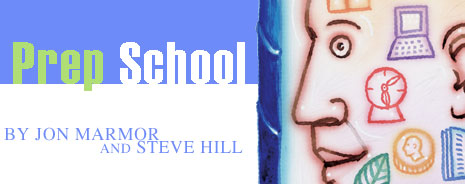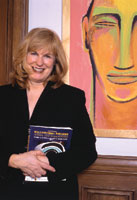

The $5 million from the Carnegie Endowment enables the UW to rethink its entire teacher preparation program. "The question is whether teacher preparation truly enhances teacher quality," says Education Dean Wasley. "And if it does, how do we know that? That's the task of the Carnegie initiative-take the best teacher preparation programs and make them better and provide evidence that they really work."
The UW is one of 11 institutions tapped by Carnegie to participate in the initiative. The awards, endowment officials say, went to those teacher preparation programs that showed the highest capabilities and a strong interest in collaborating with arts and sciences.
The new approach starts with what Wasley calls the "undergraduate pathway." During their first two years at the UW, students interested in teaching will have the opportunity to take courses about education and they'll get some basic clinical experience outside of the classroom along the way. Prior to the Carnegie grant, the UW had no formal undergraduate program in education, offering only a master's in teaching that leads to certification in Washington state.
As part of the new approach, a freshman interested in teaching chemistry, for example, would begin working toward completing a major in that field immediately. At the same time this student would also take courses that introduce basic skills that all teachers need-a course on how children learn to read, for example. That classroom experience would be coupled with a relatively simple clinical experience such as tutoring children learning to read in a partner school.
Students will  graduate with a bachelor's in a specific major and a minor in education. But more importantly, the combination of classroom learning and clinical experience, Wasley hopes, will provide students with a realistic introduction to the field of education long before they enter the master's program.
graduate with a bachelor's in a specific major and a minor in education. But more importantly, the combination of classroom learning and clinical experience, Wasley hopes, will provide students with a realistic introduction to the field of education long before they enter the master's program.
After completing the five-quarter master's program, students will join an individually tailored mentoring group of faculty from both colleges. The group will provide subject-specific expertise and support for young teachers who are learning strategies to reach today's diverse student body. These new teachers will also have an on-site mentor-an experienced colleague who can provide helpful insights into a particular school.
"We'll get you ready for your first two years," Wasley says. "We want you to know how to teach your discipline, how to work with diverse kids, how to know if they're learning and so forth. But it's not enough. When teachers get into their first two years, we want to be sure that we're there to help put into practice what they have learned."
The support will continue into the third through fifth years of a teacher's professional career. These, too, are critical years, in part because the attrition rate remains very high during the first five years, but also because third-year teachers are working toward permanent certification by the state.
"A teacher has to have a broad repertoire of approaches for working with kids because kids learn differently. If a teacher only has one way to teach a discipline you can be assured that not all the kids in that class are going to succeed," Wasley says. And that, the dean adds, is the end game now. Students must succeed. They must be prepared to pass high-stakes tests. And the achievement gap must be narrowed.
"When we bring them back in their third year we want to say to them, 'Look, we know you've gone to school and that you were mentored during your first two years, but in order for you to be a teacher/leader in the state of Washington, a top-notch teacher who makes sure that all the kids in your classroom succeed, you have to continue to build your repertoire,' " she explains.

The UW, Wasley says, has a variety of avenues to do that. A chemistry teacher, for example, could return to campus and work on one of the UW's many cutting-edge genomic projects. Then the teacher could complete an assignment that looks into how work in the field could relate to his or her own classroom instruction.
Bothell High's Duffy, for one, likes the idea of continued learning and thinks it will be crucial if she's going to enjoy long-term success as a teacher.
"I'll never stop learning," she says. "That's a cool thing about being an educator-you're always a student. There's so much more to learn about teaching and assessment, about how to write good essay questions and how to get people to read. The list won't ever get shorter, but that's the fun of it. It should always be a challenge."
The UW is confident that more can be done to support teachers and prepare them for the increasingly difficult environment they are entering - and too often exiting - in the years after graduation. If the program succeeds, it will provide a service well beyond the state of Washington, Wasley says.
"Carnegie believes that teacher ed programs make a big difference," she says. "They also believe that some of those programs aren't very good. So they want us to provide a model program for the United States."
With this article, Columns magazine says good-bye to Jon Marmor, '94, who has been associate editor for more then 10 years and has won more than 40 awards for his writing, editing and photography. Jon continues at the UW Alumni Association as its communications manager. Steve Hill, who now works for the University of Nebraska, was a writer for the UW Office of News and Information when he wrote the original version of this article.
Go To: Page 1 | Page 2